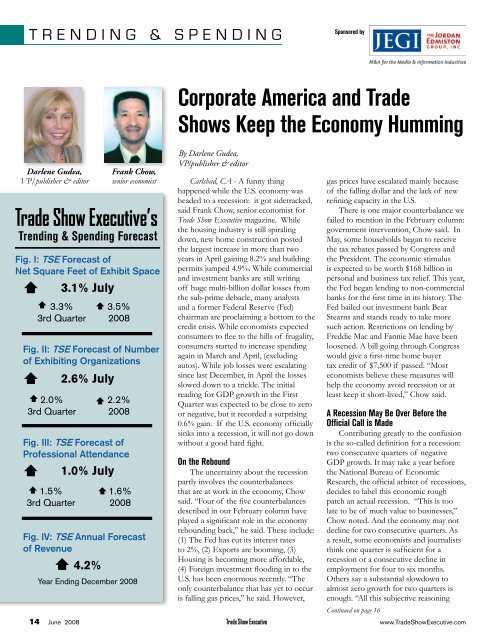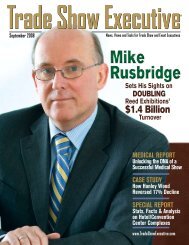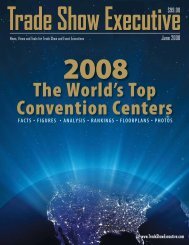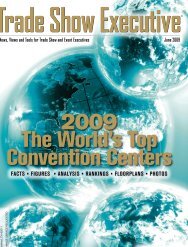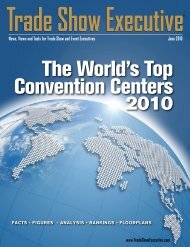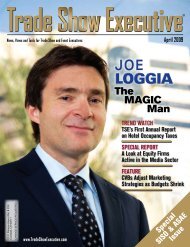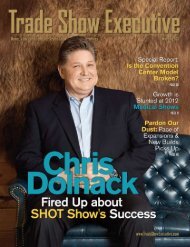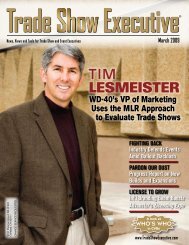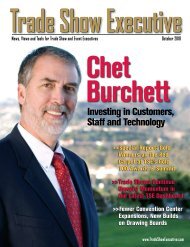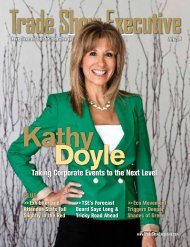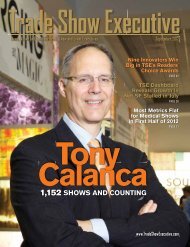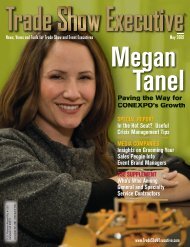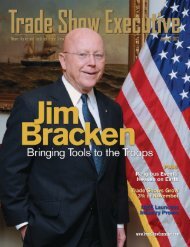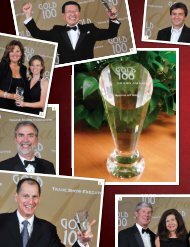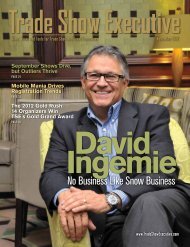the June 2008 Issue in PDF Format - Trade Show Executive
the June 2008 Issue in PDF Format - Trade Show Executive
the June 2008 Issue in PDF Format - Trade Show Executive
You also want an ePaper? Increase the reach of your titles
YUMPU automatically turns print PDFs into web optimized ePapers that Google loves.
T r e n d i n g & S p e n d i n g<br />
Sponsored by<br />
Darlene Gudea,<br />
VP/publisher & editor<br />
<strong>Trade</strong> <strong>Show</strong> <strong>Executive</strong>’s<br />
Trend<strong>in</strong>g & Spend<strong>in</strong>g Forecast<br />
Fig. I: TSE Forecast of<br />
Net Square Feet of Exhibit Space<br />
3.3%<br />
3rd Quarter<br />
Fig. II: TSE Forecast of Number<br />
of Exhibit<strong>in</strong>g Organizations<br />
2.0%<br />
3rd Quarter<br />
Fig. IlI: TSE Forecast of<br />
Professional Attendance<br />
1.5%<br />
3rd Quarter<br />
3.1% July<br />
2.6% July<br />
1.0% July<br />
3.5%<br />
<strong>2008</strong><br />
2.2%<br />
<strong>2008</strong><br />
1.6%<br />
<strong>2008</strong><br />
Fig. lV: TSE Annual Forecast<br />
of Revenue<br />
4.2%<br />
Frank Chow,<br />
senior economist<br />
Year End<strong>in</strong>g December <strong>2008</strong><br />
Corporate America and <strong>Trade</strong><br />
<strong>Show</strong>s Keep <strong>the</strong> Economy Humm<strong>in</strong>g<br />
By Darlene Gudea,<br />
VP/publisher & editor<br />
Carlsbad, CA - A funny th<strong>in</strong>g<br />
happened while <strong>the</strong> U.S. economy was<br />
headed to a recession: it got sidetracked,<br />
said Frank Chow, senior economist for<br />
<strong>Trade</strong> <strong>Show</strong> <strong>Executive</strong> magaz<strong>in</strong>e. While<br />
<strong>the</strong> hous<strong>in</strong>g <strong>in</strong>dustry is still spiral<strong>in</strong>g<br />
down, new home construction posted<br />
<strong>the</strong> largest <strong>in</strong>crease <strong>in</strong> more than two<br />
years <strong>in</strong> April ga<strong>in</strong><strong>in</strong>g 8.2% and build<strong>in</strong>g<br />
permits jumped 4.9%. While commercial<br />
and <strong>in</strong>vestment banks are still writ<strong>in</strong>g<br />
off huge multi-billion dollar losses from<br />
<strong>the</strong> sub-prime debacle, many analysts<br />
and a former Federal Reserve (Fed)<br />
chairman are proclaim<strong>in</strong>g a bottom to <strong>the</strong><br />
credit crisis. While economists expected<br />
consumers to flee to <strong>the</strong> hills of frugality,<br />
consumers started to <strong>in</strong>crease spend<strong>in</strong>g<br />
aga<strong>in</strong> <strong>in</strong> March and April, (exclud<strong>in</strong>g<br />
autos). While job losses were escalat<strong>in</strong>g<br />
s<strong>in</strong>ce last December, <strong>in</strong> April <strong>the</strong> losses<br />
slowed down to a trickle. The <strong>in</strong>itial<br />
read<strong>in</strong>g for GDP growth <strong>in</strong> <strong>the</strong> First<br />
Quarter was expected to be close to zero<br />
or negative, but it recorded a surpris<strong>in</strong>g<br />
0.6% ga<strong>in</strong>. If <strong>the</strong> U.S. economy officially<br />
s<strong>in</strong>ks <strong>in</strong>to a recession, it will not go down<br />
without a good hard fight.<br />
On <strong>the</strong> Rebound<br />
The uncerta<strong>in</strong>ty about <strong>the</strong> recession<br />
partly <strong>in</strong>volves <strong>the</strong> counterbalances<br />
that are at work <strong>in</strong> <strong>the</strong> economy, Chow<br />
said. “Four of <strong>the</strong> five counterbalances<br />
described <strong>in</strong> our February column have<br />
played a significant role <strong>in</strong> <strong>the</strong> economy<br />
rebound<strong>in</strong>g back,” he said. These <strong>in</strong>clude:<br />
(1) The Fed has cut its <strong>in</strong>terest rates<br />
to 2%, (2) Exports are boom<strong>in</strong>g, (3)<br />
Hous<strong>in</strong>g is becom<strong>in</strong>g more affordable,<br />
(4) Foreign <strong>in</strong>vestment flood<strong>in</strong>g <strong>in</strong> to <strong>the</strong><br />
U.S. has been enormous recently. “The<br />
only counterbalance that has yet to occur<br />
is fall<strong>in</strong>g gas prices,” he said. However,<br />
gas prices have escalated ma<strong>in</strong>ly because<br />
of <strong>the</strong> fall<strong>in</strong>g dollar and <strong>the</strong> lack of new<br />
ref<strong>in</strong><strong>in</strong>g capacity <strong>in</strong> <strong>the</strong> U.S.<br />
There is one major counterbalance we<br />
failed to mention <strong>in</strong> <strong>the</strong> February column:<br />
government <strong>in</strong>tervention, Chow said. In<br />
May, some households began to receive<br />
<strong>the</strong> tax rebates passed by Congress and<br />
<strong>the</strong> President. The economic stimulus<br />
is expected to be worth $168 billion <strong>in</strong><br />
personal and bus<strong>in</strong>ess tax relief. This year,<br />
<strong>the</strong> Fed began lend<strong>in</strong>g to non-commercial<br />
banks for <strong>the</strong> first time <strong>in</strong> its history. The<br />
Fed bailed out <strong>in</strong>vestment bank Bear<br />
Stearns and stands ready to take more<br />
such action. Restrictions on lend<strong>in</strong>g by<br />
Freddie Mac and Fannie Mae have been<br />
loosened. A bill go<strong>in</strong>g through Congress<br />
would give a first-time home buyer<br />
tax credit of $7,500 if passed. “Most<br />
economists believe <strong>the</strong>se measures will<br />
help <strong>the</strong> economy avoid recession or at<br />
least keep it short-lived,” Chow said.<br />
A Recession May Be Over Before <strong>the</strong><br />
Official Call is Made<br />
Contribut<strong>in</strong>g greatly to <strong>the</strong> confusion<br />
is <strong>the</strong> so-called def<strong>in</strong>ition for a recession:<br />
two consecutive quarters of negative<br />
GDP growth. It may take a year before<br />
<strong>the</strong> National Bureau of Economic<br />
Research, <strong>the</strong> official arbiter of recessions,<br />
decides to label this economic rough<br />
patch an actual recession. “This is too<br />
late to be of much value to bus<strong>in</strong>esses,”<br />
Chow noted. And <strong>the</strong> economy may not<br />
decl<strong>in</strong>e for two consecutive quarters. As<br />
a result, some economists and journalists<br />
th<strong>in</strong>k one quarter is sufficient for a<br />
recession or a consecutive decl<strong>in</strong>e <strong>in</strong><br />
employment for four to six months.<br />
O<strong>the</strong>rs say a substantial slowdown to<br />
almost zero growth for two quarters is<br />
enough. “All this subjective reason<strong>in</strong>g<br />
Cont<strong>in</strong>ued on page 16<br />
14 <strong>June</strong> <strong>2008</strong> <strong>Trade</strong> <strong>Show</strong> <strong>Executive</strong> www.<strong>Trade</strong><strong>Show</strong><strong>Executive</strong>.com


